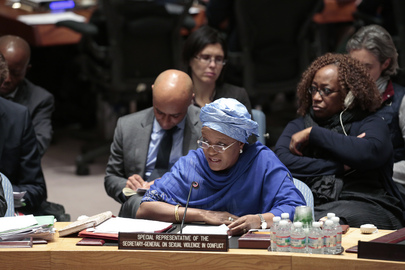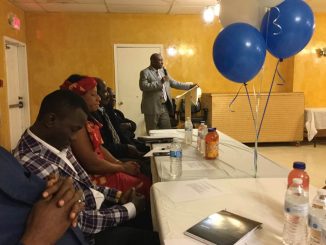
STATEMENT OF ZAINAB HAWA BANGURA
SPECIAL REPRESENTATIVE OF THE SECRETARY-GENERAL
ON SEXUAL VIOLENCE IN CONFLICT
SECURITY COUNCIL OPEN DEBATE
ON SEXUAL VIOLENCE IN CONFLICT
25 April 2014
I wish to thank you, Secretary-General, for your presence here today and for your personal and steadfast commitment to this cause.
I wish to thank the Government of Nigeria for hosting this Open Debate which comes at a crucial moment of consolidation of this agenda; as well as this Council for the concerted focus and priority you have given this issue for several years.
I am also grateful that Ambassador Tete Antonio of the African Union and Ms. Rhoda Misaka representing civil society are able to join us to offer your valuable perspectives.
~
Madame President, Members of the Security Council, Ladies and Gentlemen
It has been two years since I took responsibility for this mandate.
I could not have imagined how difficult and heartbreaking it would be.
The horrors suffered by the women, children and men that I have met re-affirm my conviction that sexual violence in conflict represents the great moral issue of our time.
This crime, in its utter destruction of the individual and the pervasive way in which it undermines the prospect of peace and development, casts a long shadow over our collective humanity. That is why it deserves and requires the singular attention afforded by this Council.
~
It was a year ago that I visited Bosnia and witnessed first-hand the long-term implications of war-time sexual violence left unaddressed. An estimated 50,000 women were targeted with sexual violence during 4 years of conflict. But 20 years after the peace was made, impunity for these crimes still reigns.
The truth, most likely, is that the survivors will see no justice, because the evidence is long lost and the perpetrators have long since ‘fled the immediate scene of the crime’. Yet, the irony is that those same perpetrators are not so far gone in reality. They still walk among the women and their families, occupying positions of authority and power that shield them from justice.
For the victims, those perpetrators are a daily reminder of their broken lives. But the impunity that the perpetrators continue to enjoy is also a reminder to all of us – A reminder of our commitment to justice and accountability.
One of the questions raised by the Secretary-General in this year’s report is:
‘What about the children born of rape?’
In Bosnia these children – possibly hundreds or even thousands – are now teenagers. How have they fared? Are they also pursued by stigma and shame? What are their health and psychological needs? What are their prospects for education and employment?
For me, the survivors of sexual violence in Bosnia are not only the courageous women that I met. Their children and families are also survivors. Therefore, today I once again make an appeal on their behalf:
Even if justice in the courts of law has so far been denied, the survivors must have reparations – livelihood support, education for their children and the medical and psychosocial services that they deserve and require.
~
The Secretary-General’s report also raises a number of other themes, such as the acute vulnerability of refugee and IDP communities; the lack of services for survivors; men and boys as victims; and the concerted focus now required on prevention, among others.
The report covers 20 conflict and post-conflict situations.
It lists 34 state and non-state parties credibly suspected as perpetrators of sexual violence.
It paints a grim picture of a problem the true scale, scope and character of which we do not yet fully comprehend. However, today we do have a deeper understanding of this phenomenon than before, and that knowledge is a source of hope that we can come to grips with conflict-related sexual violence.
~
While the road ahead remains long and hard, there is some light on the horizon. Never before in history have we seen such a level of political will and momentum. Historic declarations by the G8 and by the General Assembly last year extend and reinforce the consensus that already exists in the Security Council.
Today the circle of stakeholders on this issue is dramatically expanded. This may once have been the concern of the lone gender adviser, but that is no longer the case. Now it also engages political leaders at the highest level, uniformed peacekeepers, mediators, ceasefire monitors, war crimes prosecutors, and the full range of civilian protection, justice and security sector actors.
Resolution 2106 reinforces the infrastructure and the elements of accountability and compliance established by 1820, 1888 and 1960 – An accountability regime based on reliable and timely information and analysis, and the political and operational level actions that must be taken on the basis of such information.
In its scope, operational detail and clarity, 2106 captures the evolution of our understanding of conflict-related sexual violence and what it takes to prevent it. It outlines for the first time a framework to curb and prevent this crime.
Therefore, in terms of international legal norms and instruments, we now have the tools required to turn the tide on this crime. Our critical challenge now is converting ‘political will’ into ‘practical action’, transforming the ‘resolutions’ into ‘solutions’, and driving real change on the ground.
~
Coming into this role, my priority has been to deepen national ownership, leadership and responsibility. There have been some modest but meaningful gains in this regard.
Last year the Governments of the DRC and Somalia signed Joint Communiques with the United Nations outlining priority areas of intervention to address sexual violence. These commitments were undertaken at the highest levels of Government, and are the basis for implementation plans that are now being developed by the national authorities in concert with the United Nations and other partners.
In the DRC, there were 187 convictions of soldiers and Commanders between July 2011 and December 2013, and 39 prosecutions related to the Minova incident. In Guinea, there have also been high-level indictments related to sexual violence that occurred 2009 in the wake of the contested elections. The UN Team of Experts has also been supporting national authorities in Colombia, Cote d’Ivoire and South Sudan. And in CAR, the Team is supporting the establishment of a specialized rapid response unit of the Gendarmerie to deal with sexual violence crimes.
At the regional level, we have signed a Framework of Cooperation between the United Nations and African Union which outlines key areas in which we intend to strengthen our cooperation, including more operationally oriented training for AU and UN peacekeeping personnel.
This progress is crucial and indicates that addressing conflict-related sexual violence is not a ‘mission impossible’. I believe that the progress vindicates the investment and focus of the Security Council, and is an encouragement to you to ‘stay the course’ and reinforce your efforts.
~
Over the past few years we have also gained greater clarity on the role that military and other security personnel can play in protection and prevention, and an important investment has been made in training to enhance operational readiness of our peacekeepers.
As we continue to drive this agenda to the ground, we will need to consider how to deepen and systematize the role of the defense and security sector – peacekeepers as well as other national military and police personnel. To better focus our collective action, I believe it will be important to agree and clearly articulate the key priorities for intervention by defense and security sector actors, in areas such as military justice; monitoring, information and early-warning; and, in the context of security sector reform, disarmament, demobilization and reintegration processes, and in ceasefire monitoring. These priorities are consistent with the elements of prevention under 2106.
Therefore, transforming military cultures to enhance protection and prevention is one of our essential priorities moving forward.
~
Madame President, Members of the Security Council,
Unfortunately, the unacceptable reality is that today it is still largely ‘cost-free’ to rape a woman, child or man in conflict. Sexual violence has been used through the ages precisely because it is such a cheap and devastating weapon. That is why the international community has placed such great emphasis on combating impunity. By focusing on impunity, we direct for the first time a more determined spotlight on the perpetrators, and by so doing we begin to re-direct the stigma and the consequences of sexual violence from the survivors to the perpetrators.
Therefore, I would like to close my remarks with a message to the perpetrators:
The spotlight is now trained on you, and we are coming after you with all the ways and means at our disposal. There is no hiding place. If you commit, or command, or condone such crimes against humanity, humanity will pursue you relentlessly, and eventually you will be held to account.
This is our solemn promise to the survivors.
THANK YOU




Leave a Reply